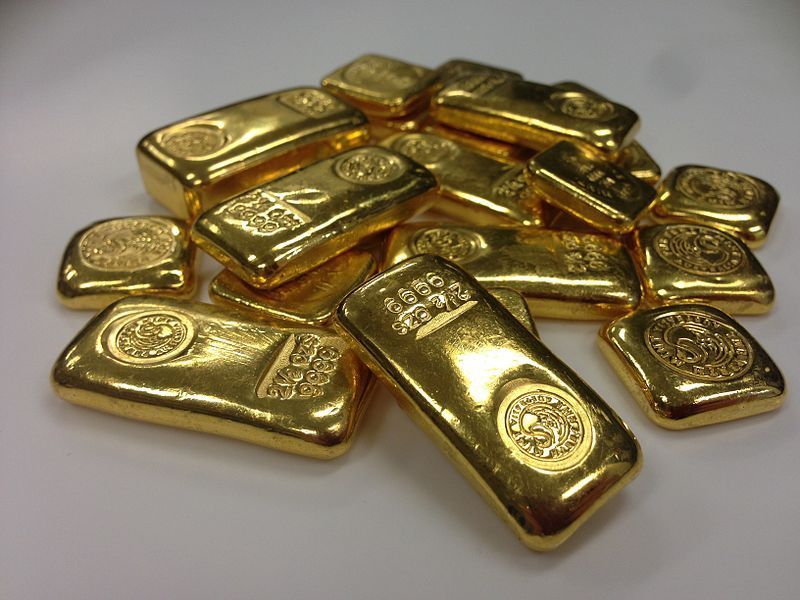Indian investors are very traditional, especially regarding what they invest their trust and money in.
There has always been a long-standing liking for investing in gold, even physical forms as coins and bullions. In fact, at times of economic trouble and confusion, one factor that held the economy functioning was gold.
There are different ways of investing in gold too. One can invest in gold in jewelry, other physical forms like coins, gold, backed equity funds, or mining companies' shares.
Like investing in equity, debts, real estate, and mutual funds, gold is also a valid option with many benefits.
In comparison to alternatives like equity, it is less subject to market risks and inflation. It diversifies one's portfolio, and allocating a part of one's investments to gold is an excellent back-up plan for crucial times.
It is a widely popular option, especially among the broad group of the average Indian middle class.
However, the notion that gold is an ideal investment skewed severely. Although it is a good investment, it indeed is not the best. Additionally, an ordinary person's knowledge about the risks in gold investments is grossly inadequate.
To name a few significant risks in gold investments would be:
The Buying and Selling Price Disparity
Given the same day, gold's buying price would always be higher than the selling price. This disparity can even be as much as 6 to 7%.
Additionally, in gold in the form of jewelry, one entirely loses the making or labor charges (which is significantly pricey at the time of purchase).
Besides this, some second-hand gold buyers also charge an additional deduction (although nominal) for testing the jewelry to determine its purity and price. This
loss can, however, be minimized by investing in forms like gold coins or bullion.
Risks of Storing
One primary reason people prefer gold investment is that it is a physical entity. This makes gold more of a liquid asset resistant to loss due to any crisis like bankruptcy or war.
But on the flip-side, the very physical nature of gold can incur risks of theft or loss. Further storing large amounts of gold coins and ingots would cost a fair amount on its own.
Tax Inefficient
Investing in gold is not considered a tax-efficient option for two reasons. On purchasing gold in India, there is a GST levied, which comes up to 3% of the value of the gold inclusive of its making charges if it is jewelry.
Further, at the time of sale, the tax levied depends on the duration of owning the entity. If the gold is sold within three years of purchase, it is considered a short-term capital gain, and otherwise, it is regarded as a long-term capital gain, and the tax levied will be according to the LTCG indexation.
In either case, the amount to be paid as tax justifies that investing in physical gold is not beneficial in the long run.
The Premium of Purchase
When purchasing gold in the form of coins or ingots, the buyer has to pay a premium of 4 to 10 %. This amount is later deducted at the time of sale. There it is a decrease in the overall returns received by investing in gold.
Slow Growth
Purchasing and storing gold as an investment does not generate any income. Compared to the exponential growth observed in the rest of investment options like stocks, gold fails to be a fast-growing competitor.
This also applies to gold stocks that are expected to be more profitable than investing in physical gold. Therefore, over time an investor is losing out on a lot of profit, they could have made if they had invested in other smarter options.
The Volatility of Prices
Gold prices are influenced by many social and political factors like the value of the US dollar, demand for gold from different countries, central banks of other governments, and even international crisis periods.
Therefore an investor is putting their money into something whose value can
vary drastically due to many reasons. The truth is that the safety and stability of
investing in gold are grossly overestimated.
Not Beneficial For The Economy
Although gold is an attractive investment for the vast majority middle class in India, it is impairing the overall economy severely. India is the largest importer of gold, and that in itself is eating away the country's GDP.
Further, when we turn to it as an investment, all the capital invested in it is
kept away from flowing into the economy and stored as ingots in closed lockers.
Further, its value only grows at a much slower rate than it would have if the
money were invested elsewhere.
Alternative Options for Investments
Given that there are risks in gold investments that widely go unchecked, there are
alternative investment options ways wherein you can invest your money and reap comparatively higher returns.
Some of them are:
Peer to Peer Lending
A system where individuals provide loans to applicants who meet specific borrower criteria. It is gaining wide acceptance and accessibility through online platforms like Lendbox that assure safety in lending and borrowing processes.
This is also because P2P lending gives better return rates above inflation, even in troubling times. Moreover, unlike usual bank loans,
P2P lending also serves loans for a broader range of customized or personal
needs like marriage, debt consolidation, credit card repayment, and even based
on a short term or long term. They are also comparatively hassle-free and
convenient.
Fixed Deposits
It is a low-risk saving option where one earns a fixed amount as interest for a sum of money deposited in the bank. However, it is not a wise option for the economy, just like a gold investment. The growth is also slower compared to other assets like equity.
Stocks and Equity
Although not everyone feels safe trying their hand in the stock market, with adequate market knowledge and awareness of risks, it is a promising investment option.
You can have a look at our post about the comparison between P2P Lending and Stocks.
The growth can be exponential if one invests in the companies with good growth potential. Drastic times don't necessarily have to call for extreme measures. With intelligent investments, one can still keep finances safe, afloat, and growing.

